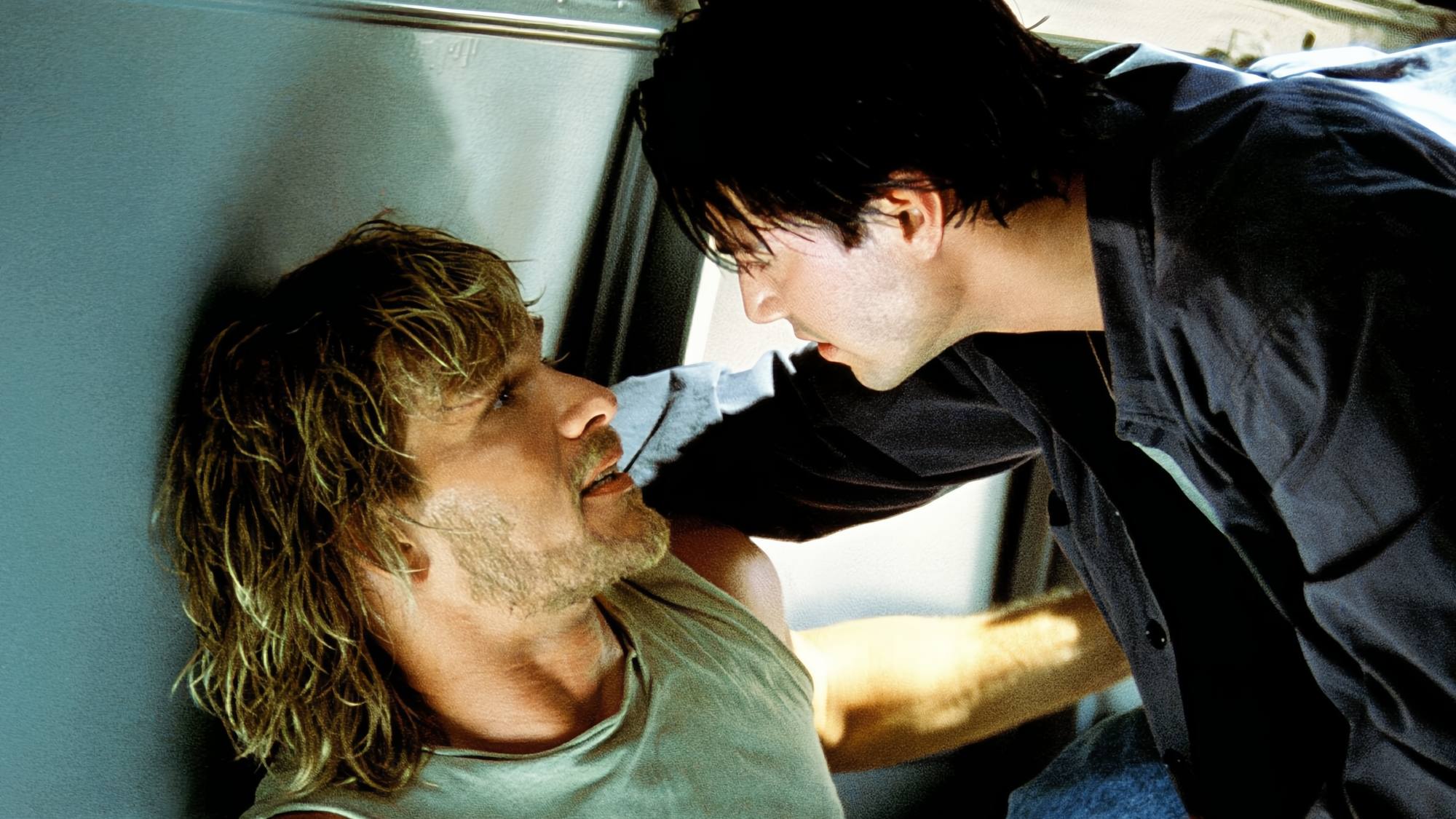I like ‘A House of Dynamite’ but this thriller is Kathryn Bigelow’s best movie — stream it on Peacock

Kathryn Bigelow is fascinated with the military-industrial complex. First, Bigelow tackled the psychological complexities of soldiers — why do they run toward danger when others avoid it? — through the eyes of a bomb squad in “The Hurt Locker.” For her next war movie, Bigelow explored obsession and one woman’s pursuit of Osama Bin Laden in “Zero Dark Thirty.”
Now, Bigelow closes out this trilogy with “A House of Dynamite,” which is now streaming on Netflix. Bigelow poses this question: How would the U.S. government react to a nuclear missile attack? The film explores how various groups — civilians, political leaders, and military personnel — respond to the missile crisis. Serving more as a cautionary tale than a political commentary, “A House of Dynamite” is a suspenseful thriller that unfolds like a ticking clock throughout its 112-minute runtime.
Despite being her first film since 2017’s “Detroit,” Bigelow hasn’t lost a step behind the camera. Selfishly, I want her to stop taking long gaps between projects and helm more films. Bigelow’s military trilogy will likely be on the first line of her resume, and rightfully so. However, my favorite Bigelow project happens to be the greatest action thriller on her resume. If you haven’t guessed by now, that movie is “Point Break.”
Subversion of the action movie
From the opening credits of “Point Break,” Bigelow teases the impending showdown between a surfer and a cop. Somehow, these two will cross paths later in the movie. How? You don’t know.
Bigelow first introduces the lawman, Johnny Utah, played by a young Keanu Reeves. After dominating a tactical course and listening to John C. McGinley rattle off some stats, Utah is presented as a hotshot FBI agent brought in to investigate a string of bank robberies by the “Ex-Presidents,” a group of thieves who wear the masks of dead presidents.
Utah is paired with a jaded agent, Angelo Pappas (Gary Busey), who believes the Ex-Presidents are surfers. Because of his athletic background as a former Ohio State quarterback and his good looks, Utah goes undercover as a surfer, hoping to become one with the surfing community in hopes of spotting his criminals. “These guys are a real tight unit,” Pappas tells Utah. “You’ll see them. You’ll know it.”
The next 20 or so minutes set the scene for a procedural police drama. An undercover cop learns to surf, infiltrates one of the communities, and catches the bad guys. Could that movie have worked? Sure, but Bigelow had other ideas. Enter Patrick Swayze, who enters the frame as Bodhi. As Bodhi glides across the waves with such grace, the audience, like Utah, can’t help but marvel at this godlike figure.
Once Bodhi enters the picture, “Point Break” moves faster than an ex-president’s heist. The scenes resemble surfing a big wave: high octane, balls-to-the-wall and over in the blink of an eye. Bigelow smartly inserts the audience into each action scene thanks to her frequent use of close-ups and handheld cameras. The scene where Utah chases Bodhi uses a pogo-cam that follows the characters’ every move. It’s a riveting POV shot — when Utah turns, the camera follows.
The same principles apply to the skydiving and surfing scenes. Instead of filming on a green screen, Bigelow retrieved footage of the actors and their doubles with cameras in the water and sky. Swayze even filmed several of the surfing and skydiving scenes, noting he nearly died six to 10 times.
“Point Break” could have easily been a good guy vs. bad guy action movie, where the former wins in the end. Bigelow is not interested in winners and losers. Utah and Bodhi, despite being on different sides of the law, are both searchers. Utah searches for purpose, while Bodhi seeks the “ultimate ride.”
“Point Break” is largely apolitical, but counterculture and rejection of authority play a role for both characters. Bodhi and his crew rob banks to rebel against authority. “It was about us against the system, that system that kills the human spirit,” Bodhi emphatically tells his comrades before their next heist.
By the end of the movie, Utah questions his allegiance to law and order. Utah catches Bodhi at the end, but he can’t help but feel empty inside. Is he doing the right thing? Utah worked so hard to find his guy, yet he still falls under Bodhi’s spell, so much so that he allows him to surf to his death. Bodhi’s ideas about rejecting the system won over Utah, who emphatically throws his badge in the ocean in the waning moments.
Over the top in the best way
Describing “Point Break” as an over-the-top action movie is a compliment in the highest form. This movie rewrote the definition of absurd. Take, for example, Utah jumping out of a plane without a parachute. Even the writers of “Fast & Furious,” who once sent a car to space, found Utah’s parachute-less airplane jump to be too extreme. It’s a stunt far past reality, but who cares? Utah has proven time and time again that he’s a crazy daredevil with an obsessive personality. Like Utah, I also say, “f*** it,” and turn off my logic.
Reeves definitely dials up some of his line readings to create some unintentional comedy. This movie came out the same year as “Bill & Ted’s Bogus Journey,” and Reeves channels the ditziness and bro-like nature of Ted Logan. The “I love these things” comment after picking up a donut and the “I am an FBI agent” yell before the final robbery are so ridiculous that it hurts.
Watching “Point Break,” my mind races to Quentin Tarantino’s famous monologue about the homoeroticism in “Top Gun” and applies it to the beach football scene. It’s the first interaction between Utah and Bodhi. Both men are feeling each other out as they lead their team to endless touchdowns on the sand. The football game has significantly less oil than the “Top Gun” beach volleyball match. However, it proves the same point — alphas are going to compete.
While every other surfer is happy to catch a few passes, Utah and Bodhi use this opportunity to flex their dominance and prove they are not afraid of one another. Utah even crashes through 17 tackles and runs 500 yards (fake numbers, by the way) to lay out and tackle Bodhi in the ocean. Anyone on that beach would have called Utah a hardo, but not Bodhi, who runs toward the former quarterback’s ambition and drive.

“Point Break” gives Utah a romantic interest in Tyler (Lori Petty), who teaches him to surf before becoming his lover. Make no mistake, the biggest romance in the movie is between Utah and Bodhi. A bromance would be a better way to describe it. Just look at the way these two lock eyes when they high-five in mid-air during their skydive. That’s an unbreakable bond that no one woman can come between.
“I know it’s hard for you, Johnny. I know you want me so bad it’s like acid in your mouth,” Bodhi says before the final skydive. Bodhi’s right — Utah wants him badly. It’s all he thinks about. After the failed raid (shoutout to Tom Sizemore), Bigelow cuts to a scene of Utah staring at the ceiling with Tyler resting on his chest. A naked woman is in bed with Utah, and all he can think about is Bodhi. With Bodhi’s long hair and an infectious personality, can you blame Utah for feeling that way?
Ultimately, the movie starts and ends with the ocean. For Utah, the water is a source of rebirth and new life. For Bodhi, the waves are his final destination, the last summit he must climb in his life. Vaya con Dios, “Point Break.” Thank you for a life-changing moviegoing experience.
Stream “Point Break” on Peacock
Follow Digitpatrox on Google News and add us as a preferred source to get our up-to-date news, analysis, and reviews in your feeds. Make sure to click the Follow button!
More from Digitpatrox
Hollywood worships the music biopic. Whether they’re made for Oscar glory (“Ray”), financial profits (“Elvis”), or both (“Walk the Line”), biopics will continue to be greenlit as long as the music industry keeps producing stars.
This fall, Jeremy Allen White trades in his knives for a guitar to play “The Boss” in “Springsteen: Deliver Me from Nowhere.” It focuses on the recording of 1982’s “Nebraska,” Springsteen’s haunting album that many consider his masterpiece. Instead of focusing on Springsteen’s rise with “Born to Run” or his superstardom in “Born in the U.S.A.,” “Deliver Me from Nowhere” elects to explore a darker, more personal time in the singer’s life.
“Deliver Me from Nowhere” depicts an unfamiliar time in the Boss’s life. If you’re looking for even more originality in a biopic, “Love & Mercy” is an unconventional biopic about Brian Wilson, one of the founding members of the Beach Boys. “Love & Mercy” embodies the spirit of its unique protagonist and presents a bold and out-of-the-ordinary drama about a musical genius.
Source link

